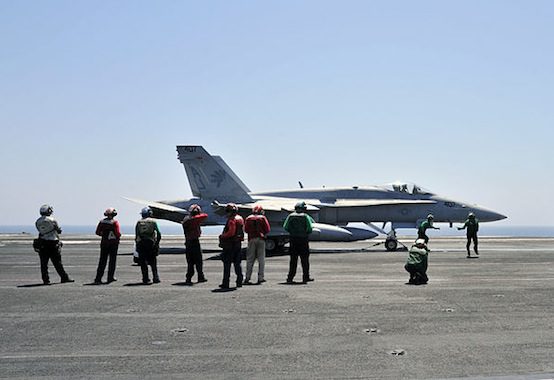Responding to the Paris Attacks

The terrorist attacks in Paris on Friday were appalling atrocities, and the U.S. should provide France with any assistance it can in investigating and pursuing all those responsible for the attacks. ISIS has claimed responsibility for the attacks, which were reportedly ordered in response to the current intervention, and we are already seeing that the immediate response is to retaliate with additional military action. However, the U.S. and France should be very wary of escalating the war on ISIS, and should seriously consider the possibility that their interventions to date have been a mistake. Western governments’ counter-terrorism policies have already been relying too heavily on military responses, and responding to the latest attacks in the same way seems very likely to backfire.
First, here is a review of what has been confirmed about the November 13 attacks so far. Early reports state that two of the attackers have been identified as French nationals who were residing in Belgium, and French police have also identified a third attacker as a French national. One of the attackers reportedly had a falsified Syrian passport obtained in Greece as part of the influx of refugees there. 132 people were murdered in six attacks that took place separately around the city. A further 352 people were injured, including 99 who were critically wounded. Seven of the attackers died. The French police have issued a warrant to arrest Salah Abdeslam, one of three brothers involved in the plot and one the attackers still at large.
Andrew Bacevich offers one of the most sensible responses I’ve seen so far to the Paris attacks:
Rather than assuming an offensive posture, the West should revert to a defensive one. Instead of attempting to impose its will on the Greater Middle East, it should erect barriers to protect itself from the violence emanating from that quarter. Such barriers will necessarily be imperfect, but they will produce greater security at a more affordable cost than is gained by engaging in futile, open-ended armed conflicts. Rather than vainly attempting to police or control, this revised strategy should seek to contain.
One might think it would be obvious after fourteen straight years of desultory warfare, but there is little reason to think that further escalating the war in Syria and Iraq now would make either of those countries, Europe, or the U.S. more secure. On the contrary, military intervention there has increased the risks to the citizens of the Western states that are now involved in the conflict, and intensifying the campaign will do more of the same.
If that is the beginning of the right response, some of the Republican presidential candidates put on a clinic over the weekend in how not to react. Marco Rubio declared that “this is a clash of civilizations” and went further to say that either “they win or we win.” Several serious problems with this spring to mind at once. First, treating the barbarism that was on display in Paris last week as an expression of any sort of civilization lends it far too much dignity. Treating terrorist attacks as part of a “clash of civilizations” is furthermore exactly how the jihadists would like the rest of the world to see what they’re doing, and it suggests that everyone else on the other side of the “civilizational” line that has been drawn has to be defeated along with them. Rubio also exaggerates the power that jihadists have by suggesting that it might be possible that they will “win” the conflict he describes. He is saying that we will be fighting an unending conflict, but that can only help those fanatics that thrive on war and upheaval. If one wished to aid jihadists in their propaganda and recruiting efforts, one could scarcely do a better job than what Rubio is doing.
Mike Huckabee outdid everyone else when he called for scrapping the nuclear deal with Iran. Even more bizarrely, he also wants to organize “a coalition that will include NATO, Russia, and nations of the Middle East to aggressively destroy ISIS,” and he thinks any state that doesn’t join the coalition should be “sanctioned and isolated.” He doesn’t acknowledge that Iran would be an obvious choice to be included in this coalition, and he doesn’t grasp that scrapping the deal with Iran would needlessly antagonize one of the “nations of the Middle East” that has been doing more than most to combat ISIS.
The war on ISIS has suffered from the beginning from having a goal of “destroying” the group without being able to achieve that goal at an acceptable cost to the U.S. and its allies. Some are estimating that a successful effort would require 150,000 troops and cost trillions of dollars, and there is clearly no political support in the West (or anywhere else) for a campaign on that scale. Whatever politicians are saying this week, it remains true that the U.S. and its allies aren’t going to achieve the goal of “destroying” ISIS at an acceptable cost, and so Bacevich’s recommendation seems like the beginning of a much wiser policy.
Comments